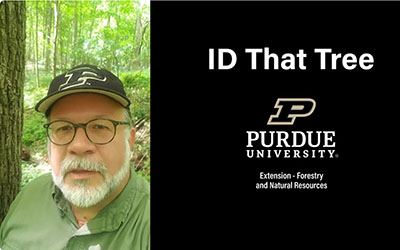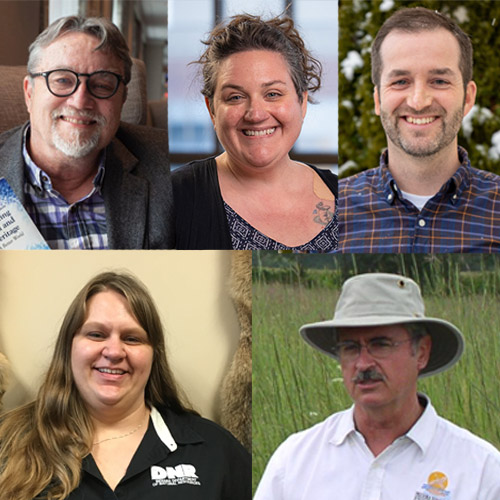Dr. Emmanuel Frimpong Honored as Distinguished Ag Alumnus
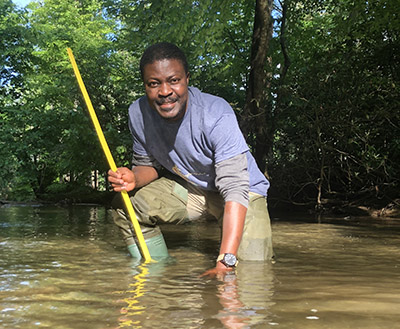
Dr. Emmanuel A. Frimpong was honored as a 2023 recipient of the Purdue Distinguished Agriculture Alumni Award at a ceremony on March 3.
The award was created in 1992 to recognize mid-career alumni of the Purdue College of Agriculture who have a demonstrated record of outstanding accomplishments, have made significant contributions to his/her profession or society in general and illustrate high potential for future professional growth.
“It seems like the climax of professional aspirations,” Frimpong said. “I have been through academia and gotten to a professional level where it didn’t feel like there was anything new to achieve, and then this news came. It was quite an honor to hear the news that I was selected for this award. It means a lot to be remembered and recognized by my alma mater. The Department of Forestry and Natural Resources is where I developed my career, where I matured and where I distinguished myself as a professional. The department gave me a very unique opportunity to build a path like none other in terms of the interdisciplinary nature of the degree I developed for myself. To be remembered has me feeling good.”
Frimpong, who earned his PhD in Aquatic Sciences at Purdue in 2005, is a professor, the associate head for graduate affairs and the graduate program director for the Department of Fish and Wildlife Conservation at Virginia Tech.
Frimpong, a native of Ghana, earned his bachelors in natural resource management from the University of Science and Technology in 1997 and a masters in aquaculture and fisheries from the University of Arkansas at Pine Bluff in 2001 before coming to Purdue and moving on to an impactful career in natural resources, one which he didn’t always see as a viable option for himself.
“Ghana is a developing country and like many developing countries, the biggest wealth is natural
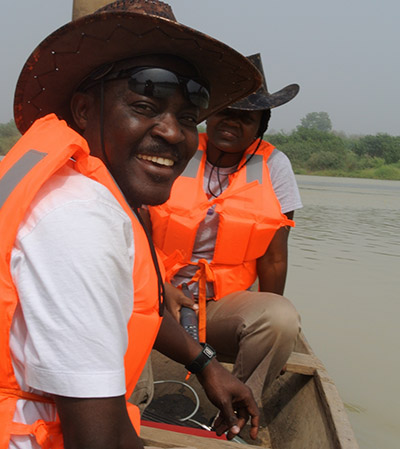
resources,” Frimpong explained. “We didn’t have a lot of career guidance necessary to get into natural resources, but I grew up like many kids, interacting with nature every day and in every way, because much of the country is still more or less in its undeveloped condition. When I got to the high school and college level and started to think about a career, it was a surprise and also exciting to see that doing things with natural resources was actually a career.
“Conservation science was a very young profession. I found myself doing fisheries and wildlife and some forestry and hearing about conservation over and over again, even though the training was geared towards exploitation of natural resources for food and for timber, etc. I also saw the environmental ruin that much of the extractive use of natural resources was causing to the country, so I started becoming more and more conservation minded as I went along.”
Frimpong received his bachelor’s degree in fisheries, but said his degree was more of a foundation in forestry with some fisheries sprinkled on. As he began his graduate studies, he honed in on a fisheries specialty due to the impact that his work could have on his home country.
“Ghana is a very unique country in the sense of the abundance of water and the consumption of fish as a consequence,” Frimpong said. “The coastline of Ghana is 500 kilometers and the largest manmade reservoir in area in the world sits in Ghana. Three percent of the total area of the country is water. Wherever you turn, there are rivers. There is a lot a of fishing, either marine or freshwater, and there is a lot of fish eating. Ghana has routinely ranked number three or four in per capita fish consumption in the world. So, there was a lot to learn about fish and how fish played such a big role in the lives of the country. I went from fisheries management to aquaculture back to fisheries management and conservation. It is all about fish, fish for food or fish for nature.”
After completing his master’s degree at Arkansas Pine Bluff, Frimpong looked to influence the fisheries field beyond research by specializing in natural resources policy and natural resources management.
Ed Buckner, who had just joined the UAPB faculty as a professor, introduced Frimpong to his alma mater and shared his research.
“His thesis and everything that he had done looked exactly like what I was hoping to do for my PhD,” Frimpong recalled. “He introduced me to the department head Dennis LeMaster and the rest is history.
“When I came in, I was studying natural resources policy, but I was a little more oriented toward the human dimensions. But, my advisor, who was a very smart man, said, you’re a scientist first and then you want to do policy. You can do as much science as you want and add the policy to it. You don’t have to completely abandon the science. He encouraged me to continue with and strengthen my work in biological sciences, while I was adding on the policy classes.”
Frimpong did exactly that, splitting his time between the Department of Forestry and Natural Resources and
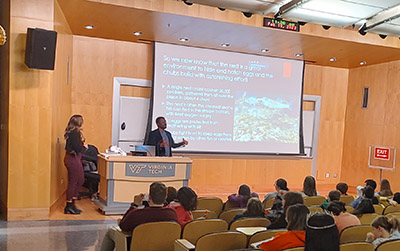
the Department of Agricultural Economics, working with John Lee, LeMaster and Trent Sutton. His dissertation was on the interaction between land use and fish communities, especially in the Upper Wabash Watershed region, and also included a look at the economics of conservation programs.
“I was basically allowed to sit between several departments - FNR, Ag Econ, Ag Systems Engineering and Biological Systems Engineering - and all of those skills came together to make me a very unique person,” Frimpong notes. “My transcripts say natural resources policy, but my thesis was very heavy in the biological sciences. I looked at how the changes that are made to the landscape affect the fish communities. Depending on the type of fish that are most impacted by certain types of land uses, especially ag, assemblage composition changes and some species become imperiled and less capable of living where they live because we change the landscape so much. I also looked at the economics of conservation reserve programs for riparian land users and also land reserves and easements and how effective they were at achieving conservation of aquatic habitat.”
After completing his PhD, Frimpong completed a postdoctoral associateship under Dr. Paul Angermeier (Agronomy 1975) at Virginia Tech. Angermeier was “a direct descendent” of Dr. Jim Karr, who introduced the biological monitoring tool called the Index of Biotic Integrity (IBI), which used fish communities and macroinvertebrates to monitor the health of rivers.
Frimpong’s project was to help Angermeier develop national scale biological monitors to assess the waters of the United States across the continent, through a project funded by the United States Geological Survey. This allowed Frimpong to take the localized work he had done in the Upper Wabash region and apply his skillset on a national level.
In December 2007, Frimpong joined the faculty at Virginia Tech after completing a master’s degree in statistics. In that role over the last 16 years, he has continued his PhD research studying how land use and human alterations of the environment affect fish communities, but added more layers to it through the study of a unique species.
“In my early years at Virginia Tech, I encountered a fish species that was like no other and its name is bluehead chub,” Frimpong said. “It is quite common in the southeastern United States, and it uses its mouth to build big gravel nests, which are used for spawning. Then, there is a whole aggregation of different species that take advantage of this species’ nest and also spawn on it because the habitat created by the bluehead chub is the best place to spawn in the stream, especially when the stream has a lot of silt. I gravitated toward studying that species as the ecology of it is so unique. I saw it as a very pivotal species for the ecosystem, because it doesn’t only build the mound for itself, it builds a mound for half of the species you find in a stream. I really drilled down the ecology of this unique species and applied it to conservation and how we do conservation now.
“We often study and try to restore habitat for species that are imperiled. Sometimes those species, especially small minnows, need a fish like the bluehead chub in order to spawn, but we study the habitat of those species without regard to those needs. Everyone thinks bluehead chub is not a species that needs protection, but another species, in the absence of the chub, is an imperiled species. So I started writing about the need to think about conservation more broadly, about communities and not individual species, and how aquatic communities are sometimes held together by species that may be common and not seen as imperiled. That has become the theme of my research, the ecology of a common species that is the keystone to many streams in North America.
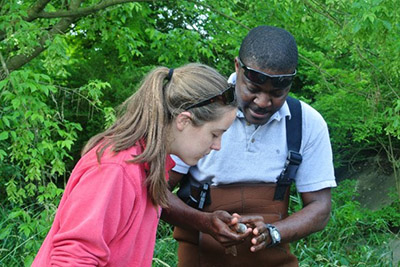
Frimpong’s research, teaching and extension programs at Virginia Tech on fish ecology and aquaculture depend heavily on both graduate and undergraduate students.
“I recognize the contribution of students to research, even students at the undergraduate and master’s level that are often not seen as the engine for research,” Frimpong stated. “In many programs we think of PhD students and postdocs as the real stalwarts for growing a research lab. What I have done is work with undergraduates and master’s students to achieve some of the same and maybe more results by teaching them to become very effective at delivering research at the same quality levels that you can with postdocs and such.”
Under his mentoring and support, many of Frimpong’s graduate students and undergraduate advisees, including five PhD and 13 master’s students and 21 undergraduate research projects, have been recognized for their excellence in producing impactful research, teaching, conservation and international development outcomes.
To fund his research, Frimpong has received external grants from the National Science Foundation, USAID, the U.S. Geological Survey, the U.S. Department of Agriculture, U.S. Fish and Wildlife Service and the Virginia Department of Wildlife Resources among others. His most recent venture is an interdisciplinary project focusing on interspecies reproductive interactions in stream fish, funded by a $1 million NSF grant.
“This recent grant was a collaborative proposal with a lab at the University of Richmond, where they are bringing a science communication component to their work using art,” Frimpong explained. “Our component is largely focused on the biology and science of this fish and its behavior and how it manages to achieve so much success in its environment. It is a four-year grant studying minnows.
“We have built a great deal of awareness about this important keystone species and it is now a much more
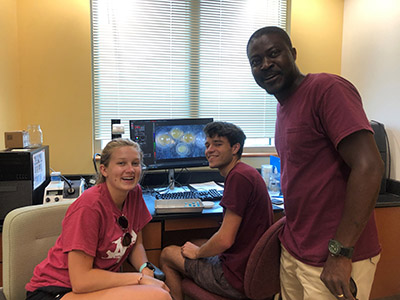
common thing to see the bluehead chub being touted as a very important species in very unexpected places. However, I think the momentum for the species to gather the recognition and protection that it deserves has just begun. I believe that minnows are going to become increasingly more recognized and important in conservation decisions because of this work that we started with one species of minnow that was just seen as a curiosity.”
Frimpong also is in the midst of projects looking at the bog turtle, stream fish and larval candy darters as well as studies on the effects of best management practices and land use on stream macroinvertebrates and fishes in the Chesapeake basin; an interdisciplinary approach to understand selfish parental care of egg and larvae in mixed-species communal nest breeding freshwater fishes; and targeted surveys to prevent the extinction of slender chub (Erimystax cahni). All told the funding for these efforts is nearly $3.4 million.
Frimpong was promoted to associate professor with tenure at Virginia Tech in 2013 and full professor in 2019. He has taught six courses: Fish Ecology, Fisheries Techniques, Marine and Freshwater Conservation Seminar, Spatial Modeling of Species and Niches, Fluvial Landscape Ecology and Species Distribution Modeling, Life History and Distribution of Fishes, and Linear Modeling and Inference on Ecological Data.
In addition to his faculty appointments, he was selected as a Carnegie African Diaspora Fellow by the Institute of International Education in 2014-15, through which he co-developed a fisheries and aquaculture curriculum in Ghana. The CADF program is a scholar fellowship program for educational projects at African higher education institutes. It allows institutions in Ghana, Kenya, Nigeria, South Africa, Tanzania and Uganda to host an African-born scholar to work in projects in research collaboration, graduate student teaching/mentoring and curriculum co-development.
“Quite early in my career I developed research in Ghana and in a couple of countries in East Africa and the goal was to give back as much as I could, and not to wait until the end of my career to try to bring whatever I had leftover to build a research program,” Frimpong said. “I was fortunate to be involved in the USAID AquaFish Collaborative Research program, which became the AquaFish Innovation Lab, that was targeted at developing countries. I worked with them for eight years before I received this Carnegie African Diaspora Fellowship to help with curriculum development at one of the universities in Ghana. It was a nice coincidence because I already had research going on in Ghana, but that work did not allow me to teach. This fellowship allowed me to be in Ghana for three months continuously to be involved in teaching in a way, doing workshops and such. It was amazing.”
In 2021, Frimpong was named as a U.S. Fulbright Scholar, through which he spent 10 months in Ghana teaching and working on sustainable aquaponics development at the University of Energy and Natural Resources.
“I was back in Ghana in 2021-22 for a different kind of fellowship because I didn’t get enough of it back in 2015 through the Carnegie African Diaspora fellowship,” Frimpong said. “The people very much appreciate the skills that I bring back to help with academic institutions, but also with the professional development of the younger people, who are not necessarily sure where the natural resources programs are going to take them.”
Both fellowship opportunities and his work at Virginia Tech have given Frimpong a platform to ensure that
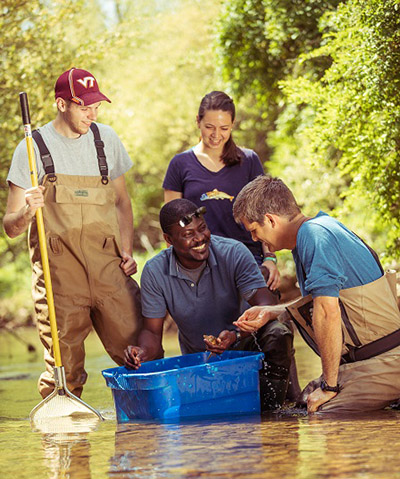
students like himself, who didn’t know about natural resources as a career, not only know that it is an option, but have a mentor in the field.
“I have that conversation all of the time; students reach out on LinkedIn or email me saying ‘I want to know what to do to become like you,’” Frimpong said. “It is quite an honor to hear a young student think that you are a role model to advise them to become successful. I take advantage of every one of those encounters to tell them about the hard work, the focus and understanding that excellence is probably the most important ingredient of success. Whatever you find yourself doing, excel at it, work and put in your all and most likely if you come up on top or close to the top, regardless of the profession or how hard it is to find a job, you are going to do fine.”
The Distinguished Alumni Award is the latest honor for Frimpong, who has received four Excellence in Teaching awards from Virginia Tech – two from the Department of Fish and Wildlife (2007 and 2009), one from the College of Natural Resources and Environment (2009) and one from the University’s Center for Excellence in Teaching and Learning (2019). He was named as an Outstanding Fisheries Faculty member in 2007, 2008 and 2009. Frimpong also received an Excellence in Access and Inclusion Award from the Virginia Tech Services for Students with Disabilities in 2019.
Internationally, Frimpong received a citation from Kwame Nkrumah University of Science and Technology in Ghana in recognition of his contribution to research and development of an aquaculture and fisheries program in Africa.
Frimpong is quick to note that his successes would not have been possible without the contributions of many individuals over the years.
“I would be remiss if I didn’t mention Dennis LeMaster, who was the head of the department at the time that I was accepted to Purdue,” Frimpong said. “He was also my advisor and brought in Trent Sutton, who was my co-advisor, and the two of them really made me into the professional that I am. John Lee in the Ag Econ department was another mentor. He essentially took me in to become his student when Dennis LeMaster retired. He gave me a computer, set me up to write my papers and finish off nicely. I really owe him thanks. I also have to thank Ed Buckner, a PhD student under Dennis LeMaster who came to Pine Bluff and introduced me to him. He left a legacy in bringing me to Purdue.
“My parents and my family have been there throughout. If I named them all, it would be a long list as I have seven siblings. I am number seven of eight. But, my parents and every one of my siblings have been extremely supportive of my journey to where I am.
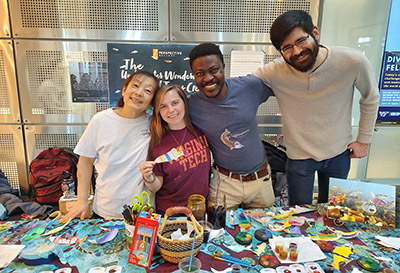
Frimpong with grad students and science-art communication collaborators presenting lectures and hands-on science activities with 9-12-year olds at Kids Tech University (KTU) in February 2023. KTU is a STEM outreach and early recruitment program hosted by Virginia Tech’s Fralin Life Sciences Institute.
Several organizations and institutions also have been key contributors to Frimpong’s research and success.
“In terms of organizations, the National Science Foundation has been amazing at supporting my research and I think a good part of my career success is because NSF supported my research,” Frimpong said. “I also have to mention the USAID as a funder. While they didn’t fund my research directly, they were the funders of the AquaFish program through Oregon State. I also have to thank Kwamena Quagrainie at Purdue, who was the African lead for the USAID program, as he passed the money from Oregon State through Purdue to Virginia Tech, which is how I funded my African research.
“At Virginia Tech, my biggest fan next to Paul Angermeier, who brought me on as a postdoc after my PhD, would be Don Orth, who was the head of the department of Fisheries and Wildlife Sciences when I was hired. He has always been a very thoughtful mentor, who just wants you to be your best, listens, gives advice and made his career long experience available to everyone and allowed all of us young faculty to bloom. In Ghana, the Kwame Nkrumah University of Science and Technology is the leading university that we worked with. In particular, Steve Amisah has become a very strong collaborator throughout the years as a dean and as the head of the department of Fisheries and Watershed Management. He isn’t just a research collaborator; he has used his administrative abilities to make our work possible.”
Professionally, Frimpong is a member of the American Fisheries Society, the Ecological Society of America, the Society for Conservation Biology and the World Aquaculture Society. He is a member of the editorial board for Freshwater Biology and Water Biology and Security.
All told, Frimpong’s research and impact on students and universities domestically and around the world make him a deserving recipient of the 2023 Purdue Distinguished Agricultural Alumni Award.
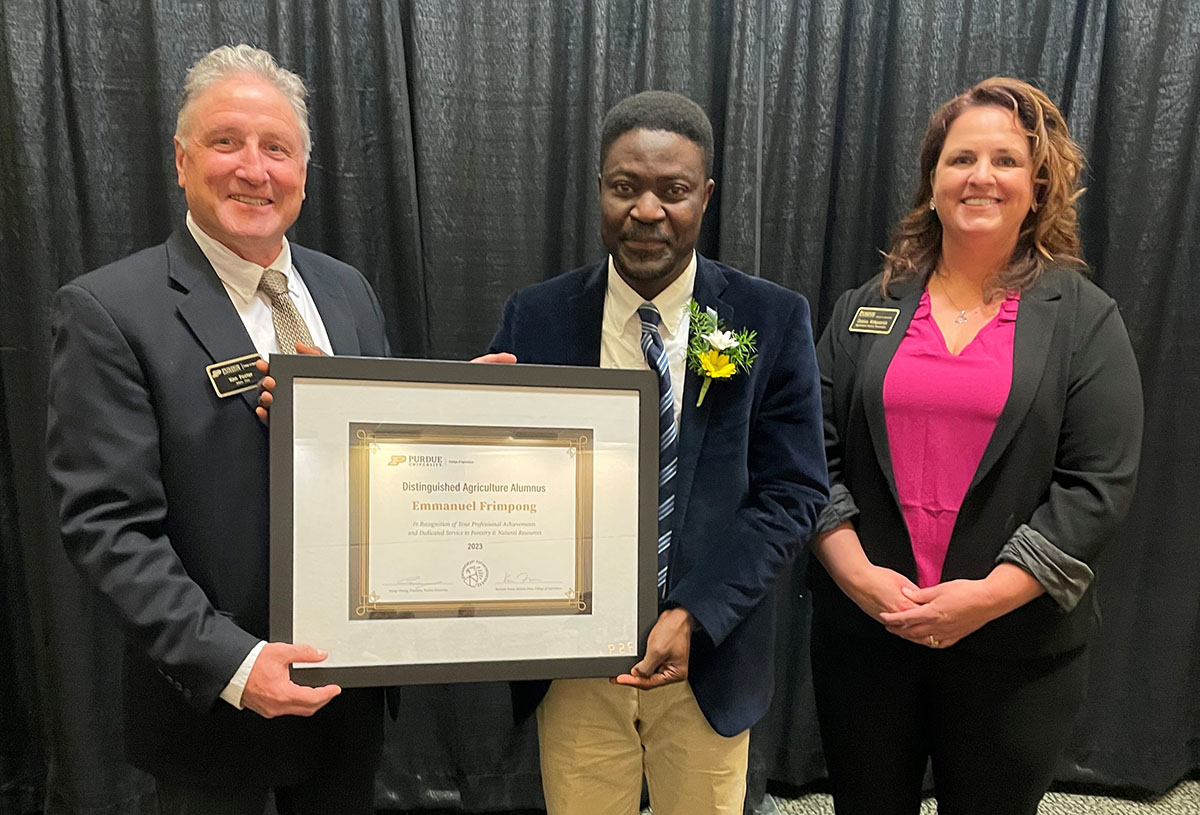 Dr. Emmanuel Frimpong receives his Distinguished Ag Alumni Award from Ken Foster, Interim Dean of Agriculture, and Danica Kirkpatrick, executive director of the Purdue Agricultural Alumni Association.
Dr. Emmanuel Frimpong receives his Distinguished Ag Alumni Award from Ken Foster, Interim Dean of Agriculture, and Danica Kirkpatrick, executive director of the Purdue Agricultural Alumni Association. 



